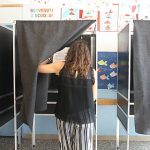
This article is the second in a two-part series. Check out part 1 here.
Even though the downhill trajectory we’ve seen over the last decades in terms of property rights is bad enough, nothing could have ever prepared us for what the covid-19 crisis would bring. Even those of us who have read enough history to know that there’s really no line that the state will not cross in its fervent pursuit of absolute power were sincerely surprised. How could the ruling elite deny us our birth given right to own our own body and mind? How could we forget the principles of the Enlightenment and what it means to live in a society based on personal freedom? If we are not allowed to own our own body and mind, then the concept of private property does not exist any longer.
It’s one thing to persuade millions of hardworking citizens to fork over a large part of their salaries to the state every single month, to pay exorbitant fees simply to take ownership of the home their parents left them after they passed away, or to pay a toll every time they wish to drive on a road that their money built and maintains. It’s quite another thing to be able to convince them that closing their businesses and being forbidden from going to work to put bread on the table is “for their own good.”
During the last two years, we witnessed an extraordinary shift the likes of which hasn’t appeared in history books in times of peace. The state, in most of the Western world, abused all the power and the leverage that it had accumulated over the governed, and the results were truly shocking.
Much like that frog in the simmering pot, we found ourselves at the boiling point, seemingly overnight. And the most striking thing about this entire pandemic ordeal, is that governments, the world over, have come out of it looking like Robin Hood instead of the sheriff of Nottingham.
With substantial assistance from mainstream and social media, the vast majority of the population remembers all the “covid relief” payments and all the handouts, once again erroneously classifying them as “free.” As for the revenue losses, the jobs that evaporated during the lockdowns, and the extreme distress and uncertainty countless households faced, all that was chalked up as the virus’s fault, as though it were covid-19 itself that forced millions of business closures.
The lessons that we learned during the pandemic must never be forgotten. For one thing, with autumn just around the corner, we could very well have a repeat of all the restrictions and enter “season 3” of the covid saga. In Europe, I recently saw mainstream news stories about the threat posed by the “omicron 5” covid variant (and since I tend to avoid these news sources in general, I suppose I missed omicrons 2, 3, and 4, or perhaps they were not as civilization-ending as number 5).
Come September, once high tourist season is over, there is little doubt another variant will emerge. Maybe omicron 6—or perhaps this new variant will be menacing enough to merit its very own Greek letter. Either way, by this point, nobody should be surprised if we see another massive wave when it comes to the restriction of our individual liberties.
What Lies Ahead
Regardless of what happens next with the covid situation, however, the primary reason why we should all remember the trespasses and the overreach we saw during the last couple of years is that domino effect of which we spoke in part 1. The ride is nowhere near over. Given that the vast majority of the population happily and eagerly made that Faustian deal of trading freedom for the illusion of safety, there is no telling how far the state will go tomorrow, exploiting that very same weakness.
As the covid ordeal clearly demonstrated, property rights really do represent that first domino when it comes to defending all the rest of our liberties. And as too many of our fellow citizens demonstrated, the “wise majority” is all too willing to allow the expropriation of their neighbors, and even of themselves, if they believe this sacrifice will protect them from all the evils and the dangers of life. Of course, this is nothing more than wishful thinking, but it is so widespread, so strongly encouraged, and so normalized that all governments have come to rely on it to garner public support, and justifiably so.
And thus, we find ourselves today in the unenviable position of having to ask what threat, what “danger,” what “crisis” the state might use next in its protection deal with the citizenry. And what will be the price for this protection? For the “war on terror” and the “war on drugs,” we gave up our communications privacy, our banking secrecy, and a large part of our property rights—at least the freedom to transact. For the “war on covid,” we gave up whatever remained, including the right to work, the right to assemble, the right to bodily integrity, and a good portion of our freedom of speech—what was left of it, anyway.
And now there is another engineered new “old” war on European soil: West against East, Europe against Asia. What belongs together must not come together, per North Atlantic Treaty Organization doctrine. And this war involves real armies with real guns, real casualties, and real devastation and destruction. The horrific images that are on a loop on most mainstream TV stations clearly point to a tangible threat, to actual, direct danger that one can see, unlike the invisible covid bug or some Mexican drug cartel far, far away. The kind of fear that the Russian army can inspire has the potential to affect far more citizens’ judgment and short-circuit their critical thinking. After all, what else can protect you from the threat posed by another state besides your own state?
It remains to be seen to what lengths governments will go this time, but if there’s one thing we know for sure, it’s that property rights will be the first of our liberties to come under fire once again. As we already saw with the sanctions, it was bank accounts, assets, and gold holdings that were primarily targeted—and not just those of Russian government entities, but also of individuals that were perceived to have links with the Russian state.
What comes next is anyone’s guess, but for all rational investors, savers, and ordinary citizens, planning ahead is most likely going to prove essential.




